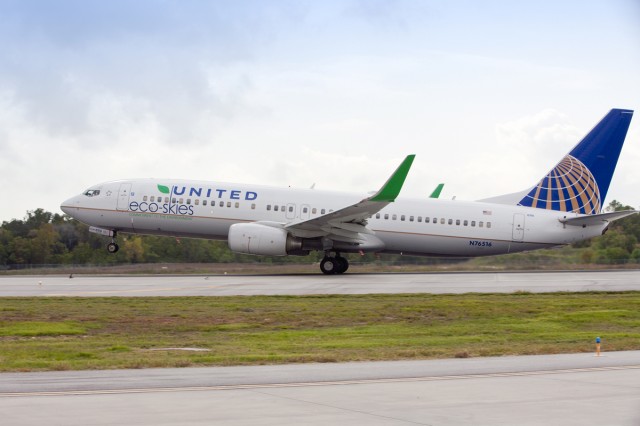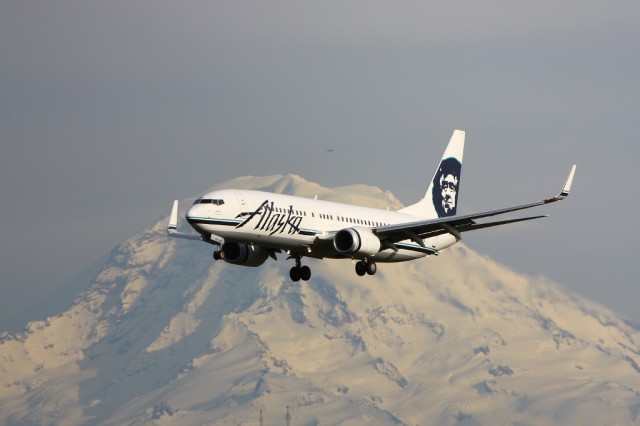Alaska Airlines announced yesterday that they will operate 75 regularly schedule flights, using renewable bio-fuels starting tomorrow, November 9th. The maiden flight will leave from Seattle (SEA) to Washington, DC (DCA) and also Portland (PDX). The airline will fuel the aircraft using a 20% blend of biofuel made from used cooking oil.
Alaska is hoping that these flights will help reduce greenhouse gas emissions by about 10%, which is equal to removing 26 cars from the road for a year. The impact of these few flights might seem minor, but if Alaska were to use the 20% biofuel mixture on all their flights, it would be the equivalent of removing 64,000 cars off of the road.
’œThis is a historic week for U.S. aviation.’ Alaska Air Group Chairman and CEO Bill Ayer stated. ’œCommercial airplanes are equipped and ready for biofuels. They will enable us to fly cleaner, foster job growth in a new industry, and can insulate airlines from the volatile price swings of conventional fuel to help make air travel more economical. To the biofuels industry, we say: If you build it, we will buy it.’
The fuel mixture is being supplied by SkyNRG and made by Dynamic Fuels (who is in a partnership with Tyson Foods). These flights by Alaska are part of the Sustainable Aviation Fuels Northwest (SAFN) initiative, which was launched in July 2010 by Alaska Airlines, Boeing, Portland International Airport, Seattle-Tacoma International Airport, Spokane International Airport and Washington State University to promote aviation biofuel development.

United Airlines's first commercial advanced biofuel flight using a Boeing 737-800 (N76516) takes off from Houston yesterday. Photo by United.
Although there is a lot of excitement in the northwest for Alaska’s first flight on Wednesday, United Airlines operated a scheduled flight using biofuels yesterday, the 7th of November. Flight 1403, a Boeing 737-800, left from Houston’s Bush Intercontinental Aiport (IAH) at about 10:30am local time for Chicago O’Hare International Airport (ORD).
’œUnited is taking a significant step forward to advance the use of environmentally responsible and cost-efficient alternative fuels,’ said Pete McDonald, United’s executive vice president and chief operations officer. ’œSustainable biofuels, produced on a large scale at an economically viable price, can one day play a meaningful role in powering everyone’s trip on an airline.’
United also announced that they have signed a letter of intent to negotiate the purchase of 20 million gallons of biofuel per year, starting as early as 2014
United beat Alaska for a revenue biofuel flight by two days, but it is not clear when or if United will continue the biofuel flights. An email to United to get clarification on their future biofuel flights has not been returned by the time of posting this story.

Sorry David, don’t mean to nit-pick, but just looking for a little context here…75 flights in what timeframe? This month? The rest of 2011? The next 12 months?
Thanks!
Really great question actually. I asked Alaska and they told me the flights will be over the next three weeks.
David
I think the important fact left out of this report is that the fuel costs $17 per gallon, many times the price of ordinary jet fuel. And the phrase “intent to negotiate” is lawyerspeak for “we’re going to discuss it, but nothing is agreed to”.
Symbolic and uneconomic. I don’t see consumers choosing an airline by the type of fuel they use – just how much it will cost to get from SEA to DCA.
Very true Donald, the biofuel is very expensive right now. But the more demand that is drummed up by folks like the airlines, will drive more manufactures to create more and find out ways on how to do it cheaper. I agree, that I do not see customers choosing to pay more because of green fuel, but getting a fuel that has a standard price, even if it costs a bit more, could be a huge thing for airlines. The volatility of oil prices causes a lot of problems for airlines now.
David
“And the phrase ”intent to negotiate” is lawyerspeak for ”we”re going to discuss it, but nothing is agreed to””
Actually that’s not precisely the case in these dealings. It’s not uncommon for entities to sign letters of intent for a portion of (SZYM in this case) scheduled production. These LOI’s are not lightly given in this particular industry, and in SZYM’s case they’ve already received LOI’s/commitments for 90%+ of their production volume through 2015.
United’s LOI represents approx 15% of SZYM’s projected production through that 2015 date, when they expect to be at a 500k metric ton cap. More importantly, as the cost/gallon drops with volume production the lack of dependence on the volatile oil market will help further balance the comparison. Expect carriers to expand their use of these blends, with an accompanying increase in the percentage of the bio products.
Incidentally, FYI the article did not note Solazyme as the source of United’s fuel (SolaJet), as well as that it was a 60/40 blend. The USN has also used 300k+ gallons already in a continuing relationship.
Thanks for posting this info. It”s an eye-opener and interesting! Nice Blog aviation and biofuel